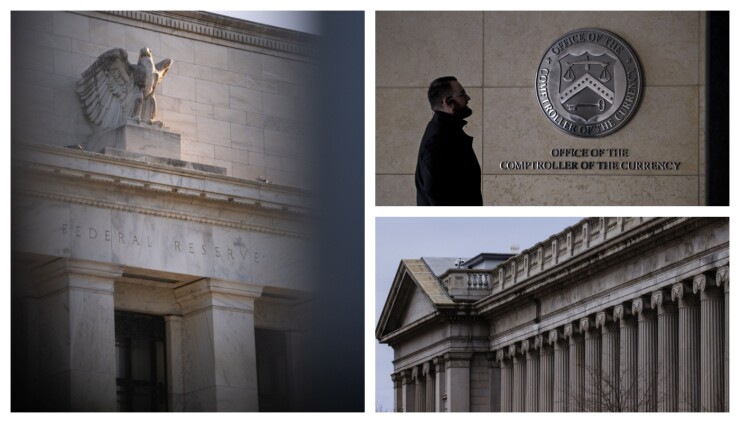Representatives from the Federal Reserve, the Treasury Department and the Office of the Comptroller of the Currency spoke Wednesday about the opportunities and perils for banks that are grappling with the impact of climate change.
The comments, which came at an industry conference in New York, illustrated the tightrope that banks are walking as they try to balance the demands of regulators who are calling for more climate risk disclosure with those of red-state officials who are resisting the transition away from fossil fuels.
Kevin Stiroh, a senior advisor in the Fed's division of supervision and regulation, advocated for climate disclosure "harmonization" to provide "interoperability" between investors, lenders and other stakeholders who are assessing decarbonization strategies.

Stiroh said that he was speaking in his capacity as co-chair of the Task Force on Climate-related Financial Risks for the Basel Committee on Banking Supervision, a global standard-setting organization.
Speaking at a conference co-sponsored by the Bank Policy Institute and The Clearing House, Stiroh called it "absolutely critical" for companies to standardize climate disclosures in order "to ensure that firms are resilient to the financial risks of climate change."
His comments come amid an ongoing debate over a Securities and Exchange Commission
Bank industry groups have withheld support for the entirety of the SEC's proposal, asking the agency to scale back certain disclosure rules.
Also speaking on the panel Wednesday was Jonathan Fink, associate chief counsel and climate risk officer at the OCC, whose remarks highlighted the fact that banks may risk a backlash in Republican-led states by embracing renewable energy.
Fink fielded a question about how some state governments are accusing lenders of going too far and moving too fast in scaling back their business with fossil-fuel companies.
So far this year, state legislatures in Oklahoma, Texas, West Virginia and other red states have proposed and enacted legislation limiting governments from participating in environmental, social and governance investment strategies and from doing business with lenders that adopt ESG policies.
In June, six financial institutions, including JPMorgan Chase,
And last month, the Republican state comptroller in Texas
Fink acknowledged familiarity with the issues raised by the state efforts but did not offer an opinion about their legality.
One category of laws focuses on barring state-level agencies from working with companies "that engage with a certain industry or refuse to do so," Fink said. The other category deals with prohibiting companies from engaging with industries.
Meanwhile, Graham Steele, the assistant Treasury secretary for financial institutions, spoke about the potential for the recently signed Inflation Reduction Act to support the U.S. economy's transition away from fossil-fuel energy sources.
The law includes $369 billion in climate-focused provisions, which Steele called a long-term policy signal that "the federal government is committed to clean energy manufacturing and to the net-zero transition."
The financial industry is offering loans for solar energy projects, carbon emission trackers, green mortgages and cash-back incentives to help customers go green.
The Inflation Reduction Act, which President Biden signed last month, will
"This is a pittance compared to what actually needs to be done," Steele said.
Speaking on the same panel was Kara Succoso Mangone,
"This isn't about green being good and brown necessarily being bad," Mangone said. "It's actually understanding that many of the hardest-to-abate, carbon-intensive sectors today are the ones that are going to need to scale up investments both over the medium to longer term."






